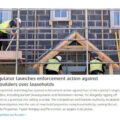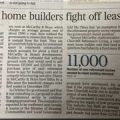CMA launches consumer law investigation into leasehold market
This follows ongoing concerns about the fairness, clarity and presentation of some leasehold contract terms, which could lead to people being stung by costly fees over a long period or having to abide by onerous terms. The CMA’s consumer protection law investigation will examine two key areas: Potential mis-selling: whether people who have bought a leasehold property are given the information they need to fully understand the obligations they are taking on, for example the requirement to pay ground rent over a certain period of time, or whether they have an accurate understanding of their ability to buy their freehold.
The CMA’s investigation into leasehold mis-selling was announced today.
It has a widened scope and it opens up the possibility of thousands of leaseholders suing plc housebuilders, who richly deserve it, in the opinion of LKP.
The house builders enveloped their customers into a sales process where it was very difficult to get independent advice on the transaction.
An arbitrary time scale was placed on the deal, with a deadline after which sales’ sweetener “incentives” or “discounts” would not apply.
The house builders controlled the bureaucracy of the entire sales process, including Help To Buy, the taxpayer subsidy to new home buyers.
Yet, as is now clear, the supposedly independent professionals involved – valuers and the conveyancing solicitors – were simply the developers’ stooges.
Promises were made again and again that simply were not kept.
For example, numerous leaseholders were promised that they could buy the freehold after two years’ occupancy. This is in fact their legal right after that time, although the developers could have sold the freehold to their customers at any point.
Buyers were assured that the price of these freeholds would be a few thousand pounds.
But – almost immediately in some cases – the house builders then flogged off the freeholders to unaccountable – often unknowable – private equity speculators, who promptly demanded tens of thousands of pounds more for the freehold.
LKP director Sebastian O’Kelly said: “We very much welcome this report. Hopefully, the CMA will find that mis-selling has taken place and this will open the goal post to any litigation that these wronged consumers chose to initiate.
“Over the past two and half years the house builders have been in denial. They have said that any issue with the sale was the responsibility of the conveyancing solicitors.
“The announcement of this inquiry demolishes that fiction.”
LKP says:
CMA launches consumer law investigation into leasehold market
The Competition and Markets Authority (CMA) has today formally launched an investigation to find out whether people are being treated fairly when buying their home.
This follows ongoing concerns about the fairness, clarity and presentation of some leasehold contract terms, which could lead to people being stung by costly fees over a long period or having to abide by onerous terms.
The CMA’s consumer protection law investigation will examine two key areas:
Potential mis-selling: whether people who have bought a leasehold property are given the information they need to fully understand the obligations they are taking on, for example the requirement to pay ground rent over a certain period of time, or whether they have an accurate understanding of their ability to buy their freehold.
Potential unfair terms: whether people are having to pay excessive fees due to unfair contract terms.
This will include administration, service, and ‘permission’ charges – where homeowners must pay freeholders and managing agents before making home improvements – and ground rents, which in some cases can double every 10 years.
George Lusty, Senior Director for Consumer Enforcement, said:
Buying a home is one of the most expensive and important purchases a person can make. So, it’s essential they fully understand the contract they are signing – including whether they will have to pay more than they bargained for.
Our investigation will shed light on potential misleading practices and unfair terms to help better protect people buying a home in future.
The CMA is writing to companies across the sector – including developers, lenders and freeholders – requiring information to understand more about how leaseholds are sold and managed, and the terms their contracts contain. It also wants to understand the impact such practices have on homeowners, and so is calling on people to share experiences that could be relevant to its work.
If the CMA thinks that a company’s practices are misleading – or that its contracts contain unfair clauses – it could take enforcement action to require the company to change how they operate.
All information relating to this investigation can be found on the case page. This includes how people can share relevant information
Leasehold
11 June 2019: The Competition and Markets Authority opened an investigation into the leasehold housing market. We will shortly be writing to a range of market participants to ask for information. The CMA is concerned about potential leasehold mis-selling, and whether leasehold contract terms are onerous and unfair in relation to ground rent, permission and other charges.





 Long Harbour hits reverse on forfeiture to £800,000 flat over £400 ground rent … and JB Leitch halves its legal bill
Long Harbour hits reverse on forfeiture to £800,000 flat over £400 ground rent … and JB Leitch halves its legal bill






















Lets all understand that it is the developer who decides if new property is sold under freehold title or leasehold title . The buyer has no part in the decision on what property title is to be offered.
This means that when the developer ::
( 1) sells a house under freehold title , the buyer gets legal ownership of the property including garden land up to the boundary fence. or .
( 2) sells a flat under leasehold title , the buyer gets a long term rental agreement and be required to pay annual ground rent and annual service charge for the entire term of the lease..
Many developers will seek to sell a new build flat under a 125 years lease at the highest price in the market and require the annual ground rent to start from approx 0.1% 0f the new property price which means £300 p.a ground rent for new property priced around £300,000.
The Developer receives £300K from each flat buyer ( i.e leaseholder ) and 25 x 0.1% (= 25 x £300 p.a ) or £7500 per flat from Ground rent investment company.
If the flat buyer is paying £300K price for the flat whilst the ground rent company pays £7,500 for freehold title , the total financing cost ( for land site, construction costs
and profit ) is paid
97.6 % by the flat buyers and
2.4% by the ground rent company.
This means, if over 97.6% of total financing cost comes from the flat buyers, it is leaseholders who collectively should be the real owner of the freehold title.
The separate sale of the freehold title giving legal ownership of the building for a trivial 2.4% to an external investment company is totally unjustified because the 2.4% could have been added onto the sale price for the flat. and included in the mortgage.
Also the Developer knows the freehold title has to be sold off in order to reclaim VAT paid out during the construction stage and inserting into the lease, a requirement for ground rent with increases at shorter intervals serves to benefit the ground rent investment company.
The situation of selling the freehold title and legal ownership of the building for 2.5% after receiving 100% sales revenue from the flat buyers is a criminal offence under Fraud Act 2006 Section 4 .( fraud by abuse of position .
The Government and every MPs has obligations to protect the interests of the retail consumer , the public buyer and end-users. It has no obligation to the ground rent investment company who pays 2.5% for the freehold ownership of the building compared to 100% paid by the flat buyer and given a rental agreement. It can only be described as a “steal” of assets paid for by leaseholders.
Everyone of the MPs in Parliament, should be made to understand that for any new block of flats, the developer receives
– 97% approx contribution from the leaseholders and
– 3% approx contribution from the ground rent investment company.
It is the developer , who commits fraud by :
( a ) taking 97% in total revenue from flat buyers and treating the buyer as a “long term rental tenant” under a 125 years lease containing unfair terms to the leaseholder.
( b) selling the freehold title of entire building to a ground rent investment company for only 3 % revenue instead of including the freehold title in the price to flat buyers.
( c) The leasehold fraud situation can be easily corrected under Justin Madders MP’s 10 Minute Bill for ending ground rent collection by the leaseholders making one payment of 10 x first year ground rent and the Bill is passed by support from 326 MPs.
( d) The Housing Minister is obliged to replace leasehold tenure by commonhold tenure because the leasehold system does not work.
Brilliant Ollie keep up the great work, my posts are being removed and moderated, no reason given but hey ho.
Long. Repetitive. Excessive. Off-topic. Discussion inhibiting …
…and thats just his first sentence!
How can it possibly be a fraud when all the terms of the lease are reviewed over a period of 2-3 months with the lessee being represented by professional advisors
I can see that you have never bought any leasehold flat in your entire life otherwise you would not ask your question..
If you have bought a leasehold property, then you would know the “professional advisors” are called conveyancing solicitors who are legal advisors and NOT fraud advisors.
If you , as a leaseholder, have actually paid 97% of the development cost for any leasehold flat , you would not spend your free time on this site making false claims about the ground rent being a fair term under the lease.
False/uneducated claims are only coming from one party here Ollie and it’s you! This situation is never going to advance with garbage like this being spouted! Admin – how do we ensure posts are reasonably accurate, informed and mature? If anybody is reading some of the spam liberally scattered it is going to take priority in the mind over any informed and sensible debate (sensational cr*p always does – just pick up a newspaper)
LKP post this information on 7th Jun 2019 :
Ian and Deborah Rice inquired about buying the freehold to their £270,000 leasehold house at Borromeo Close in Liverpool in September last year. The ground rent is £250pa linked to RPI every ten years and the lease length is 999 years.
Elan Homes told them that the price would be £7,500.
This price has been confirmed to Sebastian O’Kelly, director of the Leasehold Knowledge Partnership, by Elan Homes CEO John Kendrick: it represents 30-times annual ground rent of £250.
However, Elan Homes sold the freehold on to ground rent speculators Landmark Investments in December 2018, after which the price leapt to £15,900.
That is 63 times the annual ground rent.
My information is similar to that information posted by LKP but I am being accused of spouting “garbage”. Is Old RICS speaking as a Leaseholder or as a Developer when he accuses me of spouting garbage ?
Stephen,
I am no expert but I imagine the ordinary consumer who pays full market value for somepat only to find they don’t own that somepat in full might reasonably feel miffed if they don’t mind splitting their infinitives.
The obvious problem with leasehold is that nobody can test or prove that property X sold on day Y would have been worth more if sold freehold.
Perhaps not even you, and you seem well informed? If you have proof it would advance your cause to provide factual evidence.
Nothing to do with “professionals”.
As to article’s question, I’m not optimistic. Hope is the real killer.
Whilst the technicalities of the mathematical working out of percentages of values of freeholders as explained by Ollie are above my pay grade, what I do appreciate from his post is that for a relatively and disproportionately small investment freeholders exercise a degree of control and earning potential that is wholly unjustified.
Attention is given to earning ratios that ground rents can generate. And yet the whole purpose of a ground rent was never about making money. It was meant to be a peppercorn fee paid yearly in order to acknowledge the on-going relationship between freeholder and leaseholder and thereby ensuring the ownership of the land remains with the freeholder.
Not enough is said about the other money making opportunities that owning the freehold can bring?
If we take a close look at freeholding companies such as Long Harbour/ Fairhold, we can see in their accounts that they have purchased the freeholds on borrowed money over up to 85 years.
Vincent Tchenguiz borrowed against an income stream of an astonishing 150 years!
It may be of interest to know that “investors” such as Boardwalk or Rothesay Life are charging rates of up to 6.5 %. They also have first call on any defaults.
So, how much profit do freeholders see if not just desiring a long-term financial return, they can afford to be paying 6.5% interest on long term borrowing?
That can’t be covered merely by the round rent income can it?
They must need to earn from commissions, permissions, penalty charges that can flow,from owning the freeholds.
Even better if they can use a connected or amenable managing agent? How easy then to initiate overpriced unnecessary work?
Is it not going to the heart of the leasehold scandal that freeholding company accounts contain the warning that were the proposed changes into leasehold to be put in place it would have a material bearing on their ability to service their loans.
They themselves are saying that their business model is dependent on continuing abuse of leaseholders!
Michael
“Attention is given to earning ratios that ground rents can generate. And yet the whole purpose of a ground rent was never about making money. It was meant to be a peppercorn fee paid yearly in order to acknowledge the on-going relationship between freeholder and leaseholder and thereby ensuring the ownership of the land remains with the freeholder.”
Ground rents in the past were not a token sum
A ground rent in 1900 of £1 per annum was more than 50% of a manual workers weekly wage. It was inflation in the 1970’s which made so many rents lose value. In recent years there has been a move on the part of developers to make them more meaningful. . I was dealing with a property transaction and in the details was evidence of the property being sold with a rent from the tenant of £67 per annum and the ground rent was £6.30 per annum – around 10% of the passing rent – hardly a peppercorn
How many Victorians paid ground rent as well as a mortgage?